
PHYSICS WORLD
Scope & Guideline
Exploring the Universe of Physics and Astronomy
Introduction
Aims and Scopes
- Interdisciplinary Research:
The journal promotes research that crosses traditional boundaries, integrating physics with fields such as biology, chemistry, and environmental science. This interdisciplinary approach enhances the applicability of physics in solving real-world problems. - Emerging Technologies:
A significant focus on emerging technologies, particularly in quantum computing, renewable energy, and advanced materials, reflects the journal's commitment to exploring the future of physics and its potential societal impacts. - Educational Outreach:
Through articles aimed at educators and students, PHYSICS WORLD emphasizes the importance of physics education and the need for innovative teaching methods, thereby contributing to the development of future generations of physicists. - Public Engagement:
The journal actively engages with the public by simplifying complex physics topics and making them accessible to a broader audience, thus enhancing public interest and understanding of science. - Policy and Ethics in Physics:
Discussion of ethical issues and policy implications related to scientific research is a recurring theme, highlighting the journal’s role in addressing the societal responsibilities of physicists.
Trending and Emerging
- Quantum Technologies:
Recent publications highlight a surge in research related to quantum technologies, including developments in quantum computing and quantum communication, reflecting a growing interest in harnessing quantum mechanics for practical applications. - Climate Change and Sustainability:
The journal has increasingly published articles addressing the physics of climate change, renewable energy solutions, and sustainable technologies, showcasing the role of physics in tackling global environmental challenges. - Interdisciplinary Approaches to Health and Medicine:
Emerging themes focus on the intersection of physics with healthcare, such as medical physics and biophysics, emphasizing the importance of physics in advancing medical technologies and improving patient outcomes. - Data Science and Machine Learning:
The integration of data science and machine learning techniques in physics research is gaining traction, with articles exploring how these methods can enhance research outcomes and experimental analyses. - Social Responsibility and Ethics in Physics:
An increasing number of articles discuss the ethical implications of physics research and the responsibilities of scientists, indicating a growing awareness of the societal impacts of scientific advancements.
Declining or Waning
- Traditional Physics Education:
There has been a noticeable decrease in articles focusing solely on traditional physics education methods, as the journal increasingly prioritizes innovative and interdisciplinary approaches to teaching. - Pure Theoretical Physics:
Topics centered solely around abstract theoretical physics have seen reduced coverage, indicating a shift towards more applied and interdisciplinary research that addresses practical challenges. - Historical Perspectives on Physics:
While history remains an important aspect of science, articles that delve deeply into historical accounts and perspectives of physics have become less common, suggesting a move towards contemporary issues and future-oriented research. - Basic Research in Isolated Fields:
There is a waning focus on basic research in isolated fields of physics, as the journal emphasizes the integration of physics with other disciplines and practical applications. - Niche Areas of Research:
Certain niche areas of physics that previously received attention may now be overshadowed by more pressing global challenges, such as climate change and technological advancement.
Similar Journals

ACTA PHYSICA SINICA
Advancing the Frontiers of Physics and AstronomyACTA PHYSICA SINICA is a prominent journal published by the Chinese Physical Society, dedicated to the dissemination of groundbreaking research in the field of physics and astronomy. Established in 1993, this journal has consistently contributed to the scientific community by publishing high-quality articles that cover a wide range of topics within general physics and related disciplines. Although currently classified in Q4 of the physics and astronomy category by Scopus, ACTA PHYSICA SINICA plays an important role in fostering collaboration and communication among researchers in China and around the world. With a substantial readership, this journal is poised to remain a valuable resource for professionals, researchers, and students alike. By providing in-depth analysis and insights, it aims to advance the understanding and application of physical principles in various technological and scientific advancements. The journal is accessible via subscription, ensuring that contributors and readers can engage with the evolving landscape of physics research. For more information, visit the publisher's website.
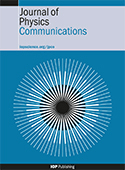
Journal of Physics Communications
Fostering Innovation in Physics and AstronomyJournal of Physics Communications, published by IOP Publishing Ltd, serves as a significant platform for the dissemination of innovative research in the realm of physics and astronomy. Since its inception in 2017, this Open Access journal has fostered a collaborative environment, allowing researchers, professionals, and students to share their findings and ideas without barriers. With an ISSN of 2399-6528, the journal has established its credibility in the academic community, achieving a ranking of Q3 in the 2023 category of Physics and Astronomy (miscellaneous), as well as a respectable position in Scopus with a rank of #122 out of 243 in its field. The journal's focus is on bridging theoretical concepts and practical applications, making it an essential resource for those engaged in the evolving landscape of physics. The Journal of Physics Communications not only aims to advance knowledge but also to inspire interdisciplinary collaboration, inviting contributions from diverse areas within physics. Authors and readers alike will find this journal particularly beneficial to stay updated on emerging trends and innovative research.
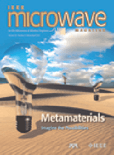
IEEE MICROWAVE MAGAZINE
Exploring the cutting-edge of microwave applications and theory.IEEE Microwave Magazine is a prestigious publication dedicated to advancing the field of microwave engineering, including theoretical developments and practical applications across various industries. Published by the IEEE-Institution of Electrical and Electronics Engineers, the magazine provides cutting-edge insights and comprehensive coverage of topics such as condensed matter physics, electrical and electronic engineering, and radiation, earning a notable Q2 ranking across these domains based on 2023 metrics. While it maintains traditional subscription access, the magazine's relevance is underscored by its substantial impact factor, making it a crucial resource for researchers, professionals, and students alike. With a commitment to fostering innovation and interdisciplinary collaboration, IEEE Microwave Magazine plays an essential role in broadcasting critical advancements and applications within the ever-evolving microwave technology landscape. This dynamic publication is designed to keep its audience informed and engaged, serving as a vital platform for the exchange of knowledge and ideas in this specialized field.
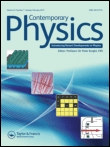
CONTEMPORARY PHYSICS
Exploring the Frontiers of Physics and AstronomyCONTEMPORARY PHYSICS, published by Taylor & Francis Ltd, stands as a notable journal in the field of physics and astronomy, offering a comprehensive platform for the dissemination of cutting-edge research and developments since its inception in 1959. With an Impact Factor that reflects its solid position within the academic community, as evidenced by its Q2 ranking in the 2023 category of Physics and Astronomy (miscellaneous) and a Scopus Rank of 111 out of 243, this journal plays an essential role in bridging theoretical advances and practical applications. Researchers and professionals are encouraged to explore its diverse scope, which aims to foster innovative ideas and foster interdisciplinary collaboration. Although not currently an open access journal, CONTEMPORARY PHYSICS is committed to maintaining the highest standards of editorial excellence and provides valuable insights across converged eras of research from 1959 to 2024, making it indispensable for those dedicated to advancing their knowledge and contributions in the realm of physics.

INDIAN JOURNAL OF PHYSICS
Fostering Knowledge Exchange in the World of PhysicsINDIAN JOURNAL OF PHYSICS, published by the Indian Association for Cultivation of Science, serves as a pivotal platform for researchers and scholars in the field of physics and astronomy. With its ISSN 0973-1458 and E-ISSN 0974-9845, this journal is committed to presenting innovative research and developments across diverse topics in physics, covering both theoretical and experimental studies. The journal has made its mark in the academic community, evidenced by its classification in the Q3 category within the Physics and Astronomy domain as of 2023, and ranks #100 out of 243 in the Scopus curated database, placing it in the 59th percentile. Spanning from 2005 to 2024, the INDIAN JOURNAL OF PHYSICS aims to foster knowledge exchange and stimulate discussions among physicists and scientific enthusiasts. Whether you are a researcher looking to publish your findings, a professional seeking updates in your field, or a student eager to explore varying aspects of physics, this journal is an invaluable resource contributing significantly to the understanding and advancement of physics in India and beyond.
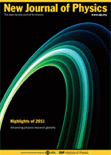
NEW JOURNAL OF PHYSICS
Innovating ideas, illuminating the world of physics.NEW JOURNAL OF PHYSICS, published by IOP Publishing Ltd, is a prestigious open-access journal that has been at the forefront of the physics community since its inception in 1998. With an impact factor that places it in the Q1 category of Physics and Astronomy (miscellaneous) and a commendable ranking of #49 out of 243 in the general physics and astronomy category according to Scopus, this journal is recognized for its significant contribution to advancing research in the field. The journal caters to a broad scope of topics, providing a platform for the dissemination of cutting-edge research findings and innovative theoretical explorations. Operating from the United Kingdom, it offers a truly international perspective, making its contents accessible and impactful to a global audience. With robust open-access options, the NEW JOURNAL OF PHYSICS ensures that research findings are freely available, promoting collaboration and knowledge sharing among researchers, professionals, and students alike. This commitment to accessibility, combined with its high-quality content, makes it an essential resource for anyone engaged in the physics community.

TECHNICAL PHYSICS LETTERS
Connecting Innovators in Technical PhysicsTechnical Physics Letters, an esteemed publication of MAIK Nauka/Interperiodica/Springer, serves as a pivotal platform for advancing the field of physics and astronomy since its establishment in 1996. This journal, with its ISSN 1063-7850 and e-ISSN 1090-6533, not only publishes high-quality research articles but also encourages innovative discussions and practical applications within the diverse realms of technical physics. With a solid reputation reflected in its Q3 category ranking within the broader physics and astronomy landscape, it aims to connect researchers and professionals who seek to address contemporary challenges and encourage multidisciplinary approaches to complex scientific problems. Although the journal does not currently offer open access options, it remains accessible to a wide readership, fostering a collaborative spirit among the scientific community. As it converges its efforts from 1996 to 2024, Technical Physics Letters is poised to be an essential resource for anyone looking to stay at the forefront of physics research.
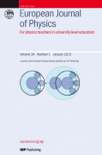
EUROPEAN JOURNAL OF PHYSICS
Exploring the Depths of Scientific DiscoveryEuropean Journal of Physics, published by IOP Publishing Ltd, is a premier international journal serving the diverse field of physics and astronomy. With a commitment to advancing scientific knowledge since its inception in 1980, the journal provides a platform for original research articles, reviews, and topical discussions in various domains, including theoretical and experimental physics. Operating out of the United Kingdom, the journal has achieved a commendable Q2 ranking in the Physics and Astronomy (miscellaneous) category for 2023, reflecting its robust influence in the academic community, alongside a notable Scopus Rank that underscores its relevance in both the Social Sciences and General Physics and Astronomy fields. Although it does not currently offer open access, the journal's traditional publication model ensures rigorous peer review, maintaining high scholarly standards that are imperative for researchers, professionals, and students striving to stay ahead in their respective fields. Don't miss the opportunity to engage with cutting-edge research and contribute to the ongoing dialogue in physics by accessing this vital resource.

Bulletin of the University of Karaganda-Physics
Connecting Minds, Expanding Horizons in Physics.Bulletin of the University of Karaganda-Physics is a distinguished open-access journal published by KARAGANDA STATE UNIVERSITY, dedicated to advancing the field of physics since its inception in 1996. With an ISSN of 2518-7198, the journal offers an essential platform for researchers, professionals, and students to disseminate and access high-quality, peer-reviewed articles covering a wide array of topics within physics. Operating from Kazakhstan, this journal plays a pivotal role in promoting scientific communication in the region and beyond by providing unrestricted access to its publications. Although specific metrics such as HIndex and Scopus rankings are currently unavailable, the Bulletin is committed to maintaining rigorous academic standards and fostering an engaging scholarly community. The journal not only aims to contribute to the academic literature but also to stimulate discourse among physicists and related disciplines, making it a valuable resource for anyone invested in understanding the complexities and advancements within the world of physics.
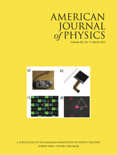
AMERICAN JOURNAL OF PHYSICS
Advancing Physics Education and Research.The American Journal of Physics (ISSN: 0002-9505, E-ISSN: 1943-2909), published by AIP Publishing, has been a cornerstone in the realm of physics education and research since its inception. With a broad scope that covers a plethora of topics in physics and astronomy, this journal serves as a vital resource for researchers, educators, and students alike, aiming to foster a deeper understanding of the fundamental principles of physics. As of 2023, it holds a commendable Q2 ranking in Physics and Astronomy (miscellaneous), reflecting its impactful contributions and rigorous peer-review process. Although the journal does not offer open access, it continues to be widely circulated, ensuring that groundbreaking research is accessible to a dedicated audience. The convergence of historical insights and contemporary advancements makes the American Journal of Physics an essential publication for those striving to stay at the forefront of the field.